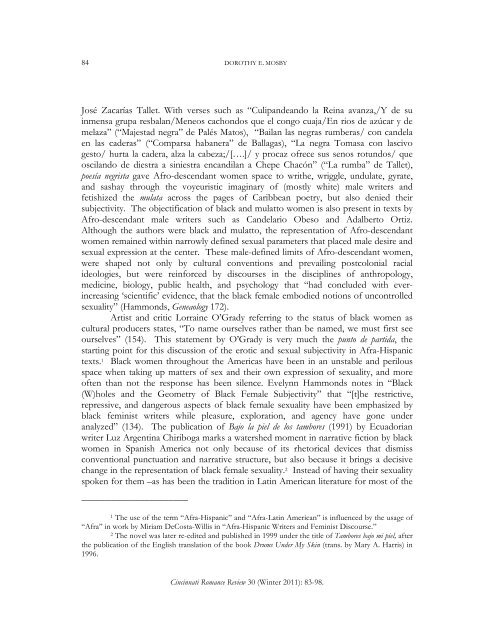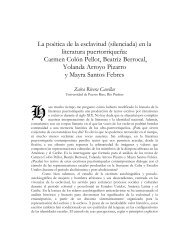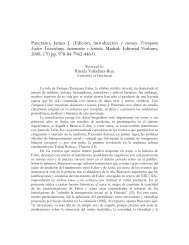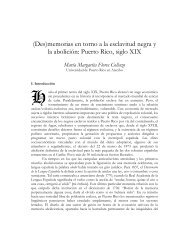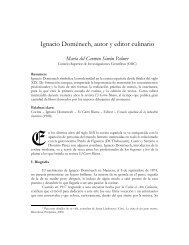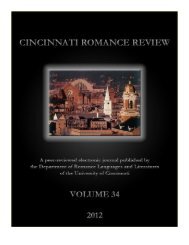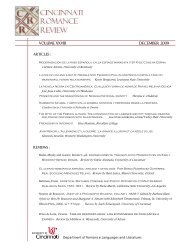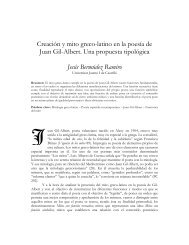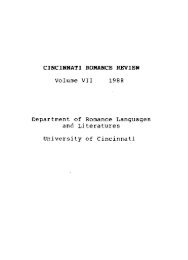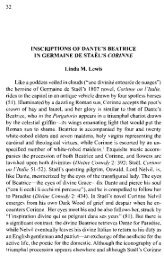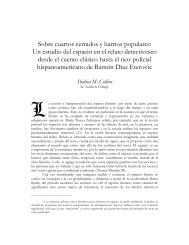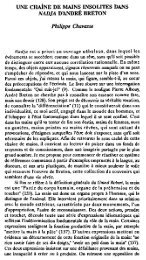Volume 30 (2011) - Cincinnati Romance Review
Volume 30 (2011) - Cincinnati Romance Review
Volume 30 (2011) - Cincinnati Romance Review
Create successful ePaper yourself
Turn your PDF publications into a flip-book with our unique Google optimized e-Paper software.
84 DOROTHY E. MOSBY<br />
José Zacarías Tallet. With verses such as “Culipandeando la Reina avanza,/Y de su<br />
inmensa grupa resbalan/Meneos cachondos que el congo cuaja/En rios de azúcar y de<br />
melaza” (“Majestad negra” de Palés Matos), “Bailan las negras rumberas/ con candela<br />
en las caderas” (“Comparsa habanera” de Ballagas), “La negra Tomasa con lascivo<br />
gesto/ hurta la cadera, alza la cabeza;/[….]/ y procaz ofrece sus senos rotundos/ que<br />
oscilando de diestra a siniestra encandilan a Chepe Chacón” (“La rumba” de Tallet),<br />
poesía negrista gave Afro-descendant women space to writhe, wriggle, undulate, gyrate,<br />
and sashay through the voyeuristic imaginary of (mostly white) male writers and<br />
fetishized the mulata across the pages of Caribbean poetry, but also denied their<br />
subjectivity. The objectification of black and mulatto women is also present in texts by<br />
Afro-descendant male writers such as Candelario Obeso and Adalberto Ortiz.<br />
Although the authors were black and mulatto, the representation of Afro-descendant<br />
women remained within narrowly defined sexual parameters that placed male desire and<br />
sexual expression at the center. These male-defined limits of Afro-descendant women,<br />
were shaped not only by cultural conventions and prevailing postcolonial racial<br />
ideologies, but were reinforced by discourses in the disciplines of anthropology,<br />
medicine, biology, public health, and psychology that “had concluded with everincreasing<br />
‘scientific’ evidence, that the black female embodied notions of uncontrolled<br />
sexuality” (Hammonds, Geneaology 172).<br />
Artist and critic Lorraine O’Grady referring to the status of black women as<br />
cultural producers states, “To name ourselves rather than be named, we must first see<br />
ourselves” (154). This statement by O’Grady is very much the punto de partida, the<br />
starting point for this discussion of the erotic and sexual subjectivity in Afra-Hispanic<br />
texts. 1 Black women throughout the Americas have been in an unstable and perilous<br />
space when taking up matters of sex and their own expression of sexuality, and more<br />
often than not the response has been silence. Evelynn Hammonds notes in “Black<br />
(W)holes and the Geometry of Black Female Subjectivity” that “[t]he restrictive,<br />
repressive, and dangerous aspects of black female sexuality have been emphasized by<br />
black feminist writers while pleasure, exploration, and agency have gone under<br />
analyzed” (134). The publication of Bajo la piel de los tambores (1991) by Ecuadorian<br />
writer Luz Argentina Chiriboga marks a watershed moment in narrative fiction by black<br />
women in Spanish America not only because of its rhetorical devices that dismiss<br />
conventional punctuation and narrative structure, but also because it brings a decisive<br />
change in the representation of black female sexuality. 2 Instead of having their sexuality<br />
spoken for them –as has been the tradition in Latin American literature for most of the<br />
______________________<br />
1 The use of the term “Afra-Hispanic” and “Afra-Latin American” is influenced by the usage of<br />
“Afra” in work by Miriam DeCosta-Willis in “Afra-Hispanic Writers and Feminist Discourse.”<br />
2 The novel was later re-edited and published in 1999 under the title of Tambores bajo mi piel, after<br />
the publication of the English translation of the book Drums Under My Skin (trans. by Mary A. Harris) in<br />
1996.<br />
<strong>Cincinnati</strong> <strong>Romance</strong> <strong>Review</strong> <strong>30</strong> (Winter <strong>2011</strong>): 83-98.


